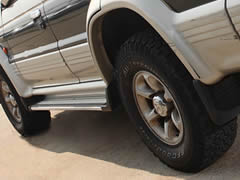Maintenance of Hub Bearings - Vol.141
An important part of any car's suspension system is the hub bearings. It is the bearings that allow the car wheel to turn smoothly. Bad bearings can have a negative influence on the suspension. For this reason, it is a good idea to regularly check the hub bearings and replace them when needed. Driving your car will be safer with good hub bearings.

Causes of Hub Bearing Failures
The most common cause of a hub bearing failure is the presence of dirt or debris in the bearing. For this to occur, the seal has to be penetrated. So you cannot repair the bearing – it must be replaced. It is not uncommon for bearings to fail over time. Any time wheels are not aligned or are not placed in the proper location, hub bearings will fail due to additional wear. When bearings are too close to the wheels, they will rub and this results in faster wear than normal.
Identification of Bad Bearings
You might hear a grinding sound coming from the suspension while driving your car. This is a common sign that your bearings are in bad shape. If you feel like your tires are wobbly or seem to wander, you might have a problem with your hub bearings. Even steering that feels loose can indicate a need to replace the bearings. For a more accurate testing of bearings, you can jack up your vehicle. Test each tire by trying to move the tire back and forth. The tires should not move at all if the bearings are good. Even a little movement is cause for concern.
Dangers of Hub Bearing Failures
Although they are small, hub bearings can be quite dangerous if they fail. When bearings no longer provide the support necessary, wheels can become loose and move around in the wheel arch. There is also the potential of the wheel coming completely off while you are driving. This will likely cause you to have an accident. If the wheel stays on, the hub will probably be damaged as will the brakes.
Impact of Hub Bearings on Vehicle Condition
Bearings that deteriorate can cause tires to wear unevenly. In fact, hub bearings have an impact on the entire structural reliability of the wheel. When bearings become degraded over time, it can result in excessive play in your wheels which is what causes the abnormal wear on tires. Sometimes bad bearings can lean to problems with wheel rotations. If this is not addressed quickly, proper wheel alignment can be jeopardized. And this can affect the integrity of your entire suspension system.
Hub Bearings and Fuel Efficiency
When bearings are in good shape, your car will drive properly which means it will be more economical on fuel use. You can also purchase bearings that are specifically designed to be fuel efficient. These bearings tend to weigh less and are thinner than traditional ones. In fact, it is possible to save as much as 30% on power consumption when you use fuel efficient bearings. This usually translates into a 2% gain in fuel efficiency for your vehicle.
Final Thoughts
Any time you suspect hub bearings are bad, you should immediately replace them. Not only are bad bearings dangerous, but they can lead to further damage to your car. You can avoid this as well as accidents by replacing the bad hub bearings. Keep in mind that many times hub bearings can go bad long before you ever realize you have a problem. During that time, they are causing damage to your vehicle. Including hub bearings on your routine maintenance checklist can minimize that damage.